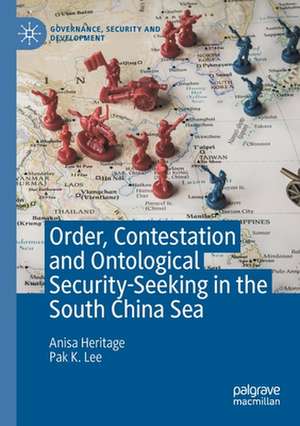Order, Contestation and Ontological Security-Seeking in the South China Sea: Governance, Security and Development
Autor Anisa Heritage, Pak K. Leeen Limba Engleză Paperback – 23 ian 2021
| Toate formatele și edițiile | Preț | Express |
|---|---|---|
| Paperback (1) | 580.82 lei 6-8 săpt. | |
| Springer International Publishing – 23 ian 2021 | 580.82 lei 6-8 săpt. | |
| Hardback (1) | 590.49 lei 6-8 săpt. | |
| Springer International Publishing – 23 ian 2020 | 590.49 lei 6-8 săpt. |
Preț: 580.82 lei
Preț vechi: 683.32 lei
-15% Nou
Puncte Express: 871
Preț estimativ în valută:
111.14€ • 116.33$ • 92.50£
111.14€ • 116.33$ • 92.50£
Carte tipărită la comandă
Livrare economică 31 martie-14 aprilie
Preluare comenzi: 021 569.72.76
Specificații
ISBN-13: 9783030348090
ISBN-10: 3030348091
Pagini: 265
Ilustrații: IX, 265 p. 2 illus. in color.
Dimensiuni: 148 x 210 mm
Greutate: 0.33 kg
Ediția:1st ed. 2020
Editura: Springer International Publishing
Colecția Palgrave Macmillan
Seria Governance, Security and Development
Locul publicării:Cham, Switzerland
ISBN-10: 3030348091
Pagini: 265
Ilustrații: IX, 265 p. 2 illus. in color.
Dimensiuni: 148 x 210 mm
Greutate: 0.33 kg
Ediția:1st ed. 2020
Editura: Springer International Publishing
Colecția Palgrave Macmillan
Seria Governance, Security and Development
Locul publicării:Cham, Switzerland
Cuprins
1. Introduction.- 2. Theoretical Framework: International Order-Building, Ontological Security and Legitimation.- 3. American Construction of Regional Order in the Asia-Pacific, 1945-1955.- 4. Developments in Regional Maritime Order from the 1970s: UNCLOS and the US Principle of Freedom of Navigation.- 5. China's Contestation of US Order-Building.- 6. Regional Contestation of China's Order-Building Project.- 7. Conclusions: A Sino-American Grand Bargain to Settle the Disputes?.
Recenzii
“This book is a useful addition to the OST literature, supplementing the many such case studies on Poland, the EU, Russian order building, even the British role in the American Civil War. It is masterfully researched with comprehensive bibliographies and analytical footnotes on both OST and SCS.” (James L Huskey, Governance, Issue (1-3), 2020)
Notă biografică
Anisa Heritage is Research Fellow in the School of Politics and International Relations at the University of Kent, UK.
Pak K. Lee is Senior Lecturer in Chinese Politics and International Relations in the School of Politics and International Relations at the University of Kent, UK.
Textul de pe ultima copertă
This book examines the South China Sea territorial disputes from the perspective of international order. The authors argue that both China and the US are attempting to impose their respective preferred orders to the region and that the observed disputes are due to the clash of two competing order-building projects. Ordering the maritime space is essential for these two countries to validate their national identities and to achieve ontological security. Because both are ontological security-seeking states, this imperative gives them little room for striking a grand bargain between them. The book focuses on how China and the US engage in practices and discourses that build, contest, and legitimise the two major ordering projects they promote in the region. It concludes that China must act in its legitimation strategy in accordance with contemporary publicly accepted norms and rules to create a legitimate maritime order, while the US should support ASEAN in devising a multilateral resolution of the disputes.
Anisa Heritage is Research Fellow in the School of Politics and International Relations at the University of Kent, UK.
Pak K. Lee is Senior Lecturer in Chinese Politics and International Relations in the School of Politics and International Relations at the University of Kent, UK.
Caracteristici
Draws on not only the study of Southeast Asian maritime history and international law, but more importantly international order and national identity theories Exposes the consequences of historical and present negative identification and misrecognition of great power roles on order- and consensus-building in the South China Sea Highlights the challenges for great powers if they seek to change the status quo without garnering social consent












